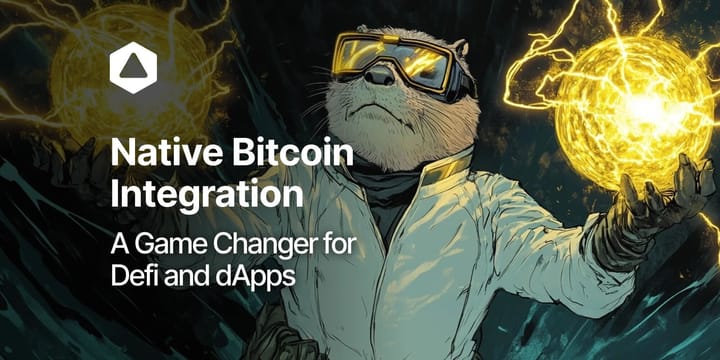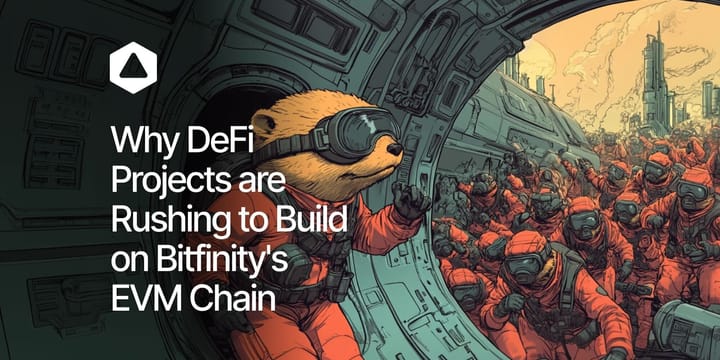DeFi 101 with InfinitySwap
Welcome to DeFi 101! In this article, we’ll cover some of the basic knowledge needed to navigate the world of DeFi and explain why InfinitySwap is uniquely poised to become the next major hub in web3 finance.

Welcome to DeFi 101! In this article, we’ll cover some of the basic knowledge needed to navigate the world of DeFi and explain why InfinitySwap is uniquely poised to become the next major hub in web3 finance.
What is DeFi?
DeFi, short for Decentralized Finance, is a broad term that encompasses many blockchain-based financial solutions. It is a developing category that includes exchanges (like InfinitySwap), lending and borrowing, insurance, fundraising, and more, and is growing every year to include a variety of new services. DeFi has often been heralded as the replacement of the traditional financial (TradFi) system, where individuals have very little control over their assets in comparison.
For many, DeFi colloquially refers to the economy that has developed around the trading of cryptocurrency. Currently, crypto trading and its related activities, such as the derivatives market and yield farming (providing liquidity to earn interest), are the best examples of why DeFi is so lauded. With DeFi, unlike its traditional counterpart, you aren’t constrained by the obstacles that intermediaries impose—having to wait days for money transfers, paying fees for a brokerage service, or any of TradFi’s numerous frustrating minutiae.
Intermediaries have always been a necessary component in TradFi, as technology limitations meant a reliance on human governance and labor. However, the negative financial impacts caused by incompetence and greed, along with increasing obfuscation of institutional policies and practices, have driven the demand for trustless* financial alternatives, now made possible through the development of blockchain technology. (*meaning that people don’t need to trust a third party)
How Does DeFi Work?
DeFi makes intermediaries obsolete through the use of smart contracts, which are digital agreements on the blockchain that are executed when certain conditions are met. Smart contracts can be written to fulfill very specific terms just as a paper contract can. Transactions are then deployed automatically, following the rules set by the programmed code instead of trusting a third party to moderate one’s financial activity.
Although most DeFi participants interact with traditional entities such as banks, and those new to crypto may stick with centralized exchanges like Coinbase, it is entirely possible to start your DeFi journey with nothing more than an internet connection and a phone or a computer. For example, one could get started by setting up a crypto wallet, charging in cryptocurrency for goods or services (or hunting legitimate airdrops—digital assets distributed for free), and using a DEX (decentralized exchange) to trade.
Trading in DeFi works similarly to how the stock market operates but without the middlemen, like custodians and clearing houses, who take a cut from your profit in fees. A further advantage is because there are no intermediaries, your assets remain your property throughout the process. When a trade-in is made in DeFi, assets are moved directly into the participating parties’ wallets, nothing is held in indeterminate escrow, and transactions are settled entirely through smart contracts.
What are the Benefits?
Lower Cost
As you can probably guess, one of the biggest advantages that DeFi has over TradFi is a significant cost reduction. Although we have seen a rise in discount brokerages like Robinhood and Webull and a consequent reduction of commission fees across the board, the truth is that retail investors are still paying a steep hidden cost.
Robinhood, for example, makes roughly 80% of its revenue by selling its customers’ orders to market makers—a controversial practice called Payment for Order Flow (PFOF) which is completely banned in Canada and the UK. PFOF is criticized because it gives institutional players valuable insight and allows them to move much more quickly than retail traders can. There’s a monumental transparency problem in how this process works, making it doubtful that retail trades are being conducted at the best possible price.
Reduced Settlement Time
Due to the nature of smart contracts, trades can be completed as fast as the blockchain can settle transactions. With the traditional market, there is typically a delay of two or three business days, an obsolete-but-persisting practice from the past when securities needed to be physically transported. With an advanced blockchain like the Internet Computer Protocol, trades can be settled almost instantly.
Self Custody: Real Ownership of Your Assets
DeFi trading means that you receive assets directly into your own wallet. There are no unpleasant surprises like being locked out of your funds or trade halts like with the traditional market—we saw this happen on a colossal scale with the GME short squeeze in 2021 when several brokerages disabled buy orders for GameStop and other volatile stocks.
Here, it’s essential to distinguish between a CEX (centralized exchange) and a DEX (decentralized exchange) like InfinitySwap. While both types of exchanges offer cryptocurrency trading, CEXs impose similar terms on their users as the TradFi companies do.
A common phrase in crypto is, “Not your keys, not your crypto.” With a centralized exchange like FTX, Binance, or Coinbase, you don’t hold your assets, leaving them subject to the whims of the centralized authority that has them in custody. Coinbase recently shocked crypto newcomers by revealing that their investments could be seized to pay off debts in the event of company bankruptcy. As unfair as that is, by keeping your assets on the exchange, you agree to their terms.
Crypto.com, another prominent CEX, incensed its users when it reversed $LUNA trades during the UST/LUNA collapse earlier this month. The company cited an internal glitch, but it’s difficult to swallow their explanation when smaller CEXs, such as Woo X, also reversed profitable trades, blaming a glitch. Was there a price feed error, or were these centralized entities taking advantage of their situation? It’s hard to say, but these are issues that are non-existent in a DEX as all trades are peer-to-peer, funds cannot be seized, and trades cannot be reversed.
24/7 Accessibility
This is one of the most significant advantages of DeFi. With stocks and other securities, you are limited to trading hours within the work week. And while digital banking has meant increased flexibility for accessing your funds, there are still hurdles like ACH confirmation delays and off times like weekends and bank holidays to deal with. This is not the case in DeFi, where you can trade and move your assets at any time.
Serving Underrepresented Communities
DeFi offers increased economic democracy. Traditional financial services are not as readily available for the disadvantaged and underbanked. Conventional banks usually require an ID to open an account, various fees like monthly maintenance charges must be paid, and loans can be challenging to obtain. It is also challenging for these demographics to access investment opportunities.
DeFi is permissionless, meaning anyone with internet access can participate without oversight from centralized authorities. DeFi wallets are free to create, and activity costs can be much lower than with traditional services—on the Internet Computer, gas (transaction fee) is practically negligible and not subject to the wild fluctuations sometimes seen in the Ethereum network. Loans are also more accessible, especially as the DeFi industry begins to explore unsecured lending (borrowing funds without collateral).
Transparency
DeFi protocols are open-source, and blockchain activity can be tracked by even those who don’t understand code. This offers the kind of data clarity that is only available to institutions in the TradFi world.
What are the Downsides?
Self Custody: A Double-Edged Sword
When you’re under centralized control, you lack freedom, but one upside is that you’re absolved of a lot of personal responsibility. With traditional service providers like Robinhood or a CEX, you can always contact customer service for help if you lose access to your account. This is not the case when using a DeFi wallet (also called a non-custodial wallet). It can only be recovered using a seed phrase, a unique group of words that essentially work as a recovery password. However, if you misplace your seed phrase or someone else gains access and then drains the balance of your wallet, there is nothing that can be done.
Mistakes and Malicious Code
Due to the immutable nature of smart contracts, actions are irreversible once it has been finalized. Therefore individuals must act with caution and continue to educate themselves as the space evolves. It doesn’t matter what kind of mistakes you make, like accidentally sending funds to the wrong address or interacting with malicious code (for example, Squid Game crypto buyers were unable to sell their tokens and got swindled out of millions, and other scams like illegitimate airdrops and phishing attacks abound in crypto). Regardless of how fair or unfair something seems, DeFi players must accept the consequences of their actions.
High Volatility
The DeFi environment is much more volatile than the traditional markets. Of course, we have seen increased volatility in the stock market in recent years, especially in the tech sector. Still, traditional investing is considered safer as you are generally dealing with companies and a system that has been in place for decades.
DeFi also moves much more quickly as it is accessible all day, every day. There is no reaction delay to news, good or bad; one could make a large sum of money in a short amount of time and lose incredible sums of money in the blink of an eye.
DeFi can be Difficult
While DeFi is accessible in many ways, there can be a barrier to entry regarding know-how. This is the primary reason CEXs have been popular despite their many disadvantages. While setting up a wallet and interacting with a DEX may be simple, you must have an understanding of how liquidity pools work, wrapping and bridging (transferring one blockchain’s token to use in another blockchain), various security cautions to take, etc., in order to fully and safely participate in the DeFi ecosystem.
Potential Regulations
There is an element of uncertainty with DeFi because government regulations are looming on the horizon. For example, some people fear that stablecoins (a cryptocurrency that is supposed to be pegged to a specific value—most stablecoins are linked to USD in a 1:1 ratio) will be wiped out once CBDCs (Central Bank Digital Currency: tokens issued by a central bank, serving as a digital form of the country’s fiat) come into the picture, specifically a digital version of the US dollar.
DeFi on the Internet Computer Protocol
The Internet Computer Protocol is very different from other blockchains that are in use today. Some key highlights are:
- It is truly scalable, meaning that it can handle large volumes of activity and operate much more efficiently; DeFi on the Internet Computer will be faster and cheaper than on other chains.
- Native integration is possible on the Internet Computer blockchain. This means that cross-chain swaps are easier and safer, with no need to wrap and bridge tokens.
- The Internet Computer Protocol uses canisters, which can be considered an advanced form of smart contracts. Unlike regular smart contracts, canisters can be deployed as either immutable or mutable. This flexibility opens the doors for innovative and customer-friendly protocols while benefiting from the security and technological advantages of running on a blockchain.
Meet InfinitySwap
Much like how the Internet Computer’s canisters are an upgraded version of smart contracts, InfinitySwap is a next-generation DEX that improves upon predecessors like Uniswap. Not only does InfinitySwap benefit from all of the advantages of running on the Internet Computer blockchain, but the team is second to none. InfinitySwap’s developer team background is heavy in cybersecurity, and they’ve already come up with robust solutions to exploits like DOS attacks and internal bugs.
InfinitySwap is being backed by some of the biggest names in the crypto world, including Polychain Capital and Parafi Capital (early investors in AAVE and Uniswap, two giants in DeFi). This shows tremendous confidence from veterans in the field and also guarantees that InfinitySwap is well-funded, thus able to develop, innovate, and serve our users through rocky market conditions.
InfinitySwap is much more than your standard DEX. We provide DeFi tools to help every kind of market participant, whether you’re a trader, long-term investor, yield farmer, or a creator/developer looking to crowdfund by creating your own token. From our advanced IS20 token standard to the SocialFi-enabled InfinitySwap wallet, you can be sure that every need has been considered.
A few examples: the InfinitySwap wallet offers you the option of creating a wallet with your Internet ID, which makes it more convenient to recover without the use of a seed phrase. Our bootstrapping liquidity pools give new developers the means to fund their projects in a secure, cost-efficient manner. A decentralized bidding market for Cycles (computational units used to power the canisters) will increase decentralization while decreasing legal liabilities to those launching their own tokens.
How to get started with InfinitySwap?
The Internet Computer Protocol is new compared to other blockchains, but the ecosystem is growing exponentially; ICP developer activity consistently ranks in the top ten cryptos for Github commits every week. As of now, DeFi has not properly kicked off, but we are getting very close to beginning.
Here at InfinitySwap, we are finalizing our products and testing them to ensure that you have a world-class, error-free experience. You can familiarize yourself with InfinitySwap, our token standard, and our wallet by reading our blog. Get involved with the InfinitySwap community via Twitter, Discord, or Telegram, and meet new friends.
You can also test out the DEX now so that you’re ready to go when tokens are released. Familiarize yourself with the InfinitySwap wallet, especially our SocialFi feature, which will allow you to copy trade and earn on your friends’ trading activities.
And of course, don’t forget to subscribe to our newsletter so that you don’t miss out on important updates!
Connect with InfinitySwap
Twitter | Website | Telegram | Discord | Github

*Disclaimer: While every effort is made on this website to provide accurate information, any opinions expressed or information disseminated do not necessarily reflect the views of InfinitySwap itself.





Comments ()